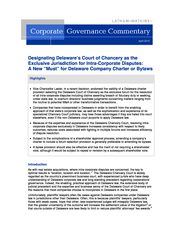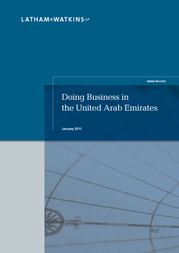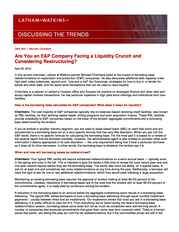Description
25
Though not as broad as we propose, certain Delaware companies have specified the Delaware Court of Chancery as
the exclusive forum for litigation between the Company and its indemnitees regarding the indemnitee’s right to
indemnification or advancement of expenses. Consistent with our recommendations, we believe Chancery to be the
appropriate forum for the resolution of such disputes and recommend the specific reference to a company’s Charter and
Bylaws to ensure the proper forum for the resolution of such disputes.
26
The sample provision does not deal with lawsuits that raise legal issues not covered by clauses (i) through (iv). An
obvious example would be federal law disclosure claims under the Securities and Exchange Act which are subject to the
exclusive jurisdiction of the federal courts. Moreover, there may be issues about the ability of the company to avoid
federal diversity jurisdiction even with respect to state law claims, especially in a situation where there is only “deemed”
consent as to the forum selection provision.
Forum selection provisions in contracts have been upheld as a valid waiver of the right to remove due to diversity. See e.g., Four River Exploration, LLC v. Bird Resources, Inc., 2010 WL 216369 (D.N.J.
Jan. 15, 2010) (remanding case to state court based on forum selection clause); Weener Plastics, Inc. v.
HNH Packaging, LLC, 2009 WL 2591291 (E.D.N.C. Aug. 19, 2009) (“A defendant may waive the right to remove, and thereby be precluded from itself removing or consenting to removal by another defendant, through entry into a valid and enforceable forum selection clause that mandates a state court as the forum for a case.”) (collecting cases); Guenther v. Crosscheck Inc., 2009 WL 1248107 (N.D.
Cal. Apr. 30, 2009) (“Where such a clause selects state court as the appropriate forum and is mandatory rather than permissive, remand is required in order to enforce the clause.”); Fleming & Hall, Ltd.
v. Cope, 30 F. Supp.2d 459 (D.
Del. 1998) (remanding case based on Delaware Court of Chancery forum selection clause). Of course, it remains to be seen whether federal courts will treat a charter or bylaw provision as having the same effect as a traditional contractual forum selection provision where the only possible basis for federal jurisdiction is diversity of the parties.
Plaintiffs asserting securities law claims under the Exchange Act, must file those claims in federal court. However, there is no reason not to try to seek the benefits of an exclusive Delaware Chancery forum selection provision. If you have any questions regarding this Commentary, please contact the Latham & Watkins LLP attorneys listed below or the Latham attorney with whom you normally consult. Derrick Farrell Steven Bauer Scott Herlihy Timothy FitzSimons Brian Cartwright John Newell Michele Kyrouz Dennis Craythorn Barry Sabin Chuck Nathan Bradley Faris Steven Stokdyk Laurie Smilan Mark Gerstein Joel Trotter James D.C. Barrall Patrick Gibbs Bradd Williamson Unsubscribe and Contact Information Corporate Governance Commentary is published by Latham & Watkins as a news reporting service to clients and other friends.
The information contained in this publication should not be construed as legal advice. Should further analysis or explanation of the subject matter be required, please contact the attorneys listed above or the attorney whom you normally consult. A complete list of our publications can be found on our website at www.lw.com. If you wish to update your contact details or customize the information you receive from Latham & Watkins, please visit www.lw.com/LathamMail.aspx to subscribe to our global client mailings program.
If you wish to be removed from our distribution, please click this link, unsubscribe@lw.com, or reply to this message with "Unsubscribe" in the subject line. This email was generated from the Latham & Watkins LLP office located at 555 West Fifth Street, Suite 800, Los Angeles, CA 900131010; Phone: +1.213.891.1200. Latham & Watkins operates as a limited liability partnership worldwide with affiliated limited liability partnerships conducting the practice in the United Kingdom, France and Italy and affiliated partnerships conducting the practice in Hong Kong, Japan and Singapore. Latham & Watkins practices in Saudi Arabia in association with the Law Office of Mohammed Al-Sheikh. Under New York's Code of Professional Responsibility, portions of this communication contain attorney advertising.
Prior results do not guarantee a similar outcome. Results depend upon a variety of factors unique to each representation. Please direct all inquiries regarding our conduct under New York's Disciplinary Rules to Latham & Watkins LLP, 885 Third Avenue, New York, NY 10022-4834, Phone: +1.212.906.1200.
© Copyright 2010 Latham & Watkins. All Rights Reserved. .
Forum selection provisions in contracts have been upheld as a valid waiver of the right to remove due to diversity. See e.g., Four River Exploration, LLC v. Bird Resources, Inc., 2010 WL 216369 (D.N.J.
Jan. 15, 2010) (remanding case to state court based on forum selection clause); Weener Plastics, Inc. v.
HNH Packaging, LLC, 2009 WL 2591291 (E.D.N.C. Aug. 19, 2009) (“A defendant may waive the right to remove, and thereby be precluded from itself removing or consenting to removal by another defendant, through entry into a valid and enforceable forum selection clause that mandates a state court as the forum for a case.”) (collecting cases); Guenther v. Crosscheck Inc., 2009 WL 1248107 (N.D.
Cal. Apr. 30, 2009) (“Where such a clause selects state court as the appropriate forum and is mandatory rather than permissive, remand is required in order to enforce the clause.”); Fleming & Hall, Ltd.
v. Cope, 30 F. Supp.2d 459 (D.
Del. 1998) (remanding case based on Delaware Court of Chancery forum selection clause). Of course, it remains to be seen whether federal courts will treat a charter or bylaw provision as having the same effect as a traditional contractual forum selection provision where the only possible basis for federal jurisdiction is diversity of the parties.
Plaintiffs asserting securities law claims under the Exchange Act, must file those claims in federal court. However, there is no reason not to try to seek the benefits of an exclusive Delaware Chancery forum selection provision. If you have any questions regarding this Commentary, please contact the Latham & Watkins LLP attorneys listed below or the Latham attorney with whom you normally consult. Derrick Farrell Steven Bauer Scott Herlihy Timothy FitzSimons Brian Cartwright John Newell Michele Kyrouz Dennis Craythorn Barry Sabin Chuck Nathan Bradley Faris Steven Stokdyk Laurie Smilan Mark Gerstein Joel Trotter James D.C. Barrall Patrick Gibbs Bradd Williamson Unsubscribe and Contact Information Corporate Governance Commentary is published by Latham & Watkins as a news reporting service to clients and other friends.
The information contained in this publication should not be construed as legal advice. Should further analysis or explanation of the subject matter be required, please contact the attorneys listed above or the attorney whom you normally consult. A complete list of our publications can be found on our website at www.lw.com. If you wish to update your contact details or customize the information you receive from Latham & Watkins, please visit www.lw.com/LathamMail.aspx to subscribe to our global client mailings program.
If you wish to be removed from our distribution, please click this link, unsubscribe@lw.com, or reply to this message with "Unsubscribe" in the subject line. This email was generated from the Latham & Watkins LLP office located at 555 West Fifth Street, Suite 800, Los Angeles, CA 900131010; Phone: +1.213.891.1200. Latham & Watkins operates as a limited liability partnership worldwide with affiliated limited liability partnerships conducting the practice in the United Kingdom, France and Italy and affiliated partnerships conducting the practice in Hong Kong, Japan and Singapore. Latham & Watkins practices in Saudi Arabia in association with the Law Office of Mohammed Al-Sheikh. Under New York's Code of Professional Responsibility, portions of this communication contain attorney advertising.
Prior results do not guarantee a similar outcome. Results depend upon a variety of factors unique to each representation. Please direct all inquiries regarding our conduct under New York's Disciplinary Rules to Latham & Watkins LLP, 885 Third Avenue, New York, NY 10022-4834, Phone: +1.212.906.1200.
© Copyright 2010 Latham & Watkins. All Rights Reserved. .













